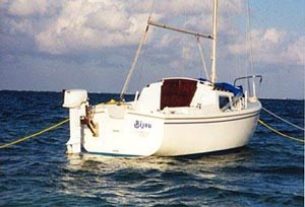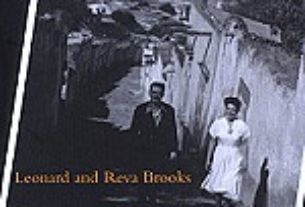Mañana is a Mexican word that I struggle to understand. I continue to learn more about this word every time that I travel in Mexico. One of my earliest lessons was learned at the lighthouse that protects the eastern point of Bahía la Ventana in Baja California Sur. The beacon guards boats from danger in the windswept waters that separate the Baja peninsula from the Isla Cerralvo in the Sea of Cortez. Hot, strong winds blow in this region and more than one ship has run afoul of wind and treacherous sandbars. One sunny February afternoon, I was driving with my family along a hard-packed sandy dirt road that led to the point. We were exploring the area from our base camp shared with a winter colony of gringo snowbirds at Ensenada de Muertos. (Cove of the Dead)
Death was our constant companion ever since our arrival in the Baja. A raw and unforgiving land, the Baja peninsula oozes life and death in perpetuity. In Baja, the desert continually meets the sea. How could they fail to miss each other? The Pacific Ocean lies to the west of the thousand mile long, narrow peninsula and the nurturing waters of the Sea of Cortez to the east. Drying remains of sea birds and skeletons of countless fish litter the beaches. Large carcasses of dead horses, donkeys, cattle and other mammal life need to be avoided on the highways. Abundant fish swim in the water and desert life darts from footsteps in the thorny brush. A tremendous variety of birds wheel and descend to the beach in a constant forage for food. Our dog, Gypsy, chased jack-rabbits daily in the cactus scrub.
Today the road emerged from the hold of the desert to straddle a vast area of tidal flats. Decaying old ditches to retain seawater in shallow lagoons surrounded the roadbed. “What are these empty pools for, Mommy?” asked little Rose, the puddle jumper. The large eroding earthwork hinted of a giant wading pool to her five year-old way of thinking. “I read that this was once a thriving salt evaporation business,” I answered with information gleaned from the Baja Adventure Book. “Baja has so much salt water and hot sun that this is a natural place for salt collection.” I continued. One of my duties as co-pilot was to attempt answers to the children’s questions while Bill, my husband continued to drive the van towards the lighthouse.
To my surprise, another vehicle was parked by the lighthouse in this isolated place. A crowd of Mexican children watched as we parked. “This looks like someone’s campsite,” I exclaimed aloud. In two months of beach camping in the Baja we met many fishermen camping on the beaches. However, their wives or children never seemed to accompany them. Although on Sundays, extended families journey to these isolated beaches from the capital city of La Paz. They cook over open fires and picnic for the whole day. Their observation of our family camping with our three children fueled their curiosity. In Mexico, where many of the poorer homes are without running water, electricity or indoor sanitation, our voluntary efforts to do without these same amenities is perhaps viewed as a variety of gringo madness. Despite any reservations regarding our strange customs, the families always invited us to sit and visit with them.
It appeared that we had driven squarely into some temporary family home. Our options suggested to us to either: turn quickly around and leave; or stay and meet the people. An easy question to answer in Mexico – meet the people, of course!
Bill and I introduced ourselves and our children to Pedro and María and their four children. The couple introduced us to Pedro’s brother, Pablito and his wife, Josefina and their six children. The brothers lived in the capital city of La Paz with their families. A week ago they had driven the sixty miles to dive for lobsters off of the Isla de Cerralvo.
The large rugged island is accessible by boat from La Paz. Many dive charters provide access to the abundant sea-life of the surrounding area. But the two brother’s car-top boat was too small to make the trip by sea safely. Although they used tanks and scuba gear, the work involved much skill. The brothers reminded me of the native deep-sea tropical pearl divers that awed the early Europeans when they arrived on these coasts 400 years ago. Then the native divers dove to amazing depths to procure the famous iridescent treasure among hazardous conditions. The brothers are the latest successors to this diving legacy.
Although it was uncommon, the families had been camping together at Ensenada de los Muertos while the men went out by day to dive. However, the arrival of strong wind forced them to postpone the diving. The families moved near the lighthouse in order for the divers to be ready to go out in the boat when the wind died down. “Where do you all sleep? I asked of them, as my roving eyes caught no sign of habitation. ” Ah, amiga” said Pedro, ” Mi esposa, mi niña (my wife, my baby) and I sleep in the back of my truck. Our children sleep with their cousins under my overturned panga. Mi hermano, su esposa y sus niños (my brother, his wife and their children) sleep in the base of the lighthouse at night.”
I looked into the back of the dilapidated pick-up truck and saw a neatly rigged fishing net hammock. Their baby lay, there, wriggling. “May I hold your baby?” I queried of María. She nodded her agreement and I reached to the back of the truck for the infant. Mexican children are all studies in perfection and this baby was no exception. Her wide brown eyes gently opened and she smiled a toothless grin at this stranger. As our eyes met, my heart melted in a liquid pool and quickly absorbed into the desert sand. “Shucks! I thought, “There goes another piece of my heart lost forever in Mexico.”
I held the baby for an hour while my husband, the two brothers and my son talked about fishing. The brothers spoke little English and we spoke little Spanish but the discussion managed to flow. Josh and Rose scampered away with the other children to play in the abandoned salt lagoons. María was busy preparing seafood stew over the low fire of mesquite (desert wood). Dinner appeared to be ready when she began grinding the fresh salsa on the large black metate (grinding stone). I distracted Bill from his pleasurable conversation and said to him, “We’d better leave before supper is ready. It looks like María nearly has it finished.” Upon our farewell, Pedro and María insisted that we take their address in La Paz. They added their sincere wish that we visit them there, mañana.
As we drove away from the families at the lighthouse, I realized that we might never see these people again. So I turned to Bill and said, ” You know, this is Mexico. Those families may not be here tomorrow even if we come back to the lighthouse. They may not be home when we pass through La Paz. Besides the diving work is so dangerous who knows if we’ll never see those guys again!” Suddenly the mañana farewell hit me like a blow between the eyes.
I exclaimed, “Hey! We’re here. They’re here, right now! So let’s go and try to find some food to buy and come back.” Bill and the kids needed little coaxing to persuade them. The desert drive back to our campsite takes forty-five minutes so Bill opted to drive for twenty minutes to the nearer village of Los Planes. This village is typical of many in Baja. It holds only a few, tiny, marginally stocked stores. I bought what food and beer that I could find and we headed back to the lighthouse.
Pedro and María looked surprised to see us return. They welcomed us to join in their supper. Our food was added to the fare and cold beers passed all around. A heavenly smell wafted from María’s fresh octopus stew. Her fresh salsa tasted marvelous on the cooked tortillas. I asked to hold her baby again to free her hands for serving the food. After supper, María and I “talked’ for an hour. My bits of Spanish combined with the silent language between women that needs few words. Our men-folk carried on their conversation.
This pleasurable after-dinner party rolled along until another vehicle unexpectedly arrived. To our surprise, two pairs of our senior gringo neighbors showed up to see the families at the lighthouse. They had all met during the previous week while camping at Ensenada de Muertos. The gringos explained that they would soon be leaving the campsite in their 54′ motor home. They wanted to give two old bicycles to the families. The bikes were handed to the brothers and couples drove away.
Most of the young children had never had an opportunity to ride a bike before. Richard, our oldest son, gave quick lessons and everyone took a turn.
The beer-drinking adults returned to their amiable discussion.
Suddenly, a loud wailing cry erupted from the direction of the desert road that led towards the salt lagoons. All of the adults jumped up and ran towards the road. We saw in the distance that Pablito’s and Josefina’s youngest son lay sprawled on the ground at the bottom of a small hill. The bike lay crashed beside him. Josefina reacted in a complete panic and ran down the hill to scoop up her crying son. I outran her and reached the boy first. I quickly examined him for serious injury or broken bones. As an emergency nurse, trained in quick assessment, I knew that a lusty cry was a good sign. Energy to wail is energy to heal. It is the quiet ones that lie still and silent that are the biggest concern. The boy was crying with fear and shaken by the fall. He displayed the customary bruises and scrapes but I found no strong signs of serious injury. Josefina cradled him like a baby and wailed louder than her child. Maria and I attempted to console them with little result. María looked at me and shrugged her shoulders as if to say, “That’s Josefina!” After ten more minutes, we left them to cry together on the road. Twenty minutes later the boy was running around the campsite with the other children.
The sun began its slow descent behind the sand blasted Baja mountain range. As twilight approached, we remembered to heed the cautionary advice never to drive after dark on rural roads in Mexico. A wandering cow or horse can bring any Baja adventure to a swift, unpleasant end. I wanted to give gifts as a token of my appreciation of the Mexican families’ hospitality. I had two dresses stored in our van, which I gave to the two ladies. I rustled up some of my children’s toys from the backseat for their children. What present could I give to the men? The answer lay in the many empty, discarded beer bottles! As I hugged María goodbye, I said that we would return mañana. She looked quizzically at me; then quietly bid me hasta luego (See you later).
The following evening my family was enjoying an evening campfire at Ensenada de Muertos. Two men startled us by riding bicycles right to our fire. It was Pedro and Pablito! They had ridden the five desert miles from the lighthouse. The brothers carried a gunnysack from which they pulled two blue-tinged pacific lobsters. “¡ Para la olla!” (For the stew pot) they laughed as they offered us the seafood. ” Muchas gracias, amigos!” I called after them as they rode their bikes quickly away into the deepening dusk. “¡ Hasta luego!”
“¡ Mañanaaa!” Returned an echoing shout from the desert scrub.


